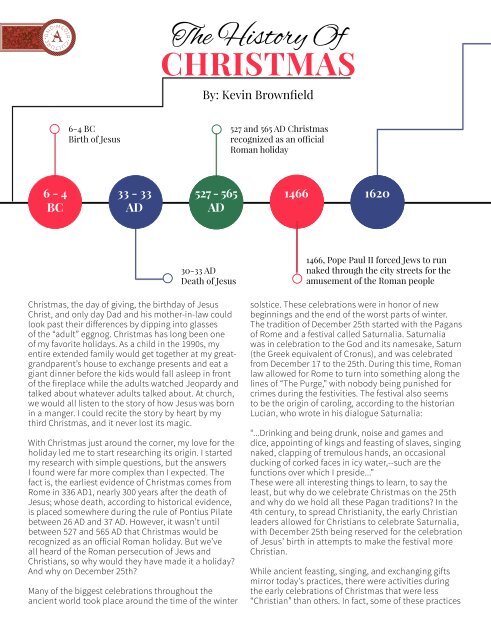autumn-issue-8-december-2015
Create successful ePaper yourself
Turn your PDF publications into a flip-book with our unique Google optimized e-Paper software.
∙and∙media∙culture<br />
22<br />
The History Of<br />
CHRISTMAS<br />
By: Kevin Brownfield<br />
6-4 BC<br />
Birth of Jesus<br />
527 and 565 AD Christmas<br />
recognized as an official<br />
Roman holiday<br />
6 - 4<br />
BC<br />
33 - 33<br />
AD<br />
527 - 565<br />
AD<br />
1466 1620<br />
30-33 AD<br />
Death of Jesus<br />
1466, Pope Paul II forced Jews to run<br />
naked through the city streets for the<br />
amusement of the Roman people<br />
Christmas, the day of giving, the birthday of Jesus<br />
Christ, and only day Dad and his mother-in-law could<br />
look past their differences by dipping into glasses<br />
of the “adult” eggnog. Christmas has long been one<br />
of my favorite holidays. As a child in the 1990s, my<br />
entire extended family would get together at my greatgrandparent’s<br />
house to exchange presents and eat a<br />
giant dinner before the kids would fall asleep in front<br />
of the fireplace while the adults watched Jeopardy and<br />
talked about whatever adults talked about. At church,<br />
we would all listen to the story of how Jesus was born<br />
in a manger. I could recite the story by heart by my<br />
third Christmas, and it never lost its magic.<br />
With Christmas just around the corner, my love for the<br />
holiday led me to start researching its origin. I started<br />
my research with simple questions, but the answers<br />
I found were far more complex than I expected. The<br />
fact is, the earliest evidence of Christmas comes from<br />
Rome in 336 AD1, nearly 300 years after the death of<br />
Jesus; whose death, according to historical evidence,<br />
is placed somewhere during the rule of Pontius Pilate<br />
between 26 AD and 37 AD. However, it wasn’t until<br />
between 527 and 565 AD that Christmas would be<br />
recognized as an official Roman holiday. But we’ve<br />
all heard of the Roman persecution of Jews and<br />
Christians, so why would they have made it a holiday?<br />
And why on December 25th?<br />
Many of the biggest celebrations throughout the<br />
ancient world took place around the time of the winter<br />
solstice. These celebrations were in honor of new<br />
beginnings and the end of the worst parts of winter.<br />
The tradition of December 25th started with the Pagans<br />
of Rome and a festival called Saturnalia. Saturnalia<br />
was in celebration to the God and its namesake, Saturn<br />
(the Greek equivalent of Cronus), and was celebrated<br />
from December 17 to the 25th. During this time, Roman<br />
law allowed for Rome to turn into something along the<br />
lines of “The Purge,” with nobody being punished for<br />
crimes during the festivities. The festival also seems<br />
to be the origin of caroling, according to the historian<br />
Lucian, who wrote in his dialogue Saturnalia:<br />
“...Drinking and being drunk, noise and games and<br />
dice, appointing of kings and feasting of slaves, singing<br />
naked, clapping of tremulous hands, an occasional<br />
ducking of corked faces in icy water,--such are the<br />
functions over which I preside...”<br />
These were all interesting things to learn, to say the<br />
least, but why do we celebrate Christmas on the 25th<br />
and why do we hold all these Pagan traditions? In the<br />
4th century, to spread Christianity, the early Christian<br />
leaders allowed for Christians to celebrate Saturnalia,<br />
with December 25th being reserved for the celebration<br />
of Jesus’ birth in attempts to make the festival more<br />
Christian.<br />
While ancient feasting, singing, and exchanging gifts<br />
mirror today's practices, there were activities during<br />
the early celebrations of Christmas that were less<br />
“Christian” than others. In fact, some of these practices


